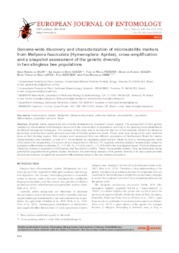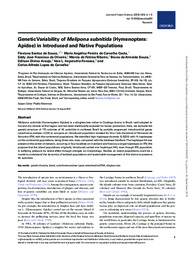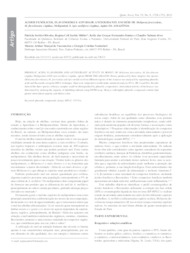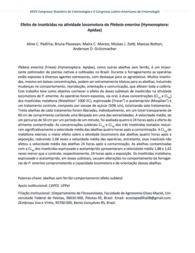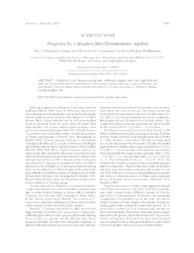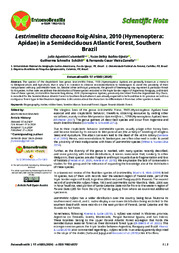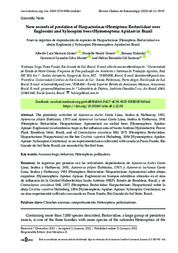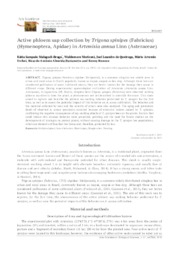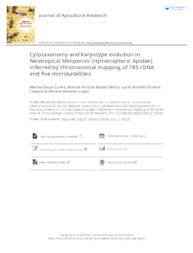Search Publications
Filter by:
| Author(s): JESUS, T. N. C. S.; VENTURIERI, G. C.; CONTRERA, F. A. L. O objetivo deste trabalho foi verificar a influência da temperatura, umidade relativa do ar, e pressão atmosférica na atividade de voo de operárias de M. fasciculata mantidas em caixas de criação. |
| Author(s): SILVA, G. R. da; SOUZA, I. G. de B.; PEREIRA, F. de M.; SOUZA, B. de A.; LOPES, M. T. do R.; BENTZEN, P.; DINIZ, F. M. Brazilian native meliponines are currently threatened by increased human impacts. The assessment of their genetic variation by microsatellite DNA markers can assist in the conservation of populations... ... |
| Author(s): SOUZA, F. S. de; COSTA, M. A. P. de C.; OLIVEIRA, E. J. F. de; RIBEIRO, M. de F.; SOUZA, B. de A.; ARAÚJO, E. D.; IMPERATRIZ-FONSECA, V. L.; CARVALHO, C. A. L. de Melipona subnitida (Hymenoptera: Apidae) is a stingless bee native to Caatinga biome in Brazil, well adapted to hot and dry climate of that region and has been traditionally explored for honey product... ... |
| Author(s): OLIVEIRA, P. S.; MÜLLER, R. C. S.; DANTAS, K. das G. F.; ALVES, C. N.; VASCONCELOS, M. A. M. de; VENTURIERI, G. C. PHENOLIC ACIDS, FLAVONOIDS AND ANTIOXIDANT ACTIVITY IN HONEY OF Melipona fasciculata, M. flavolineata (Apidae, Meliponini) AND Apis mellifera (Apidae, Apini) FROM THE AMAZON. Honey produced by three s... ... |
| Author(s): PADILHA, A. C.; PIOVESAN, B.; MORAIS, M. C.; ZOTTI, M.; BOTTON, M.; GRÜTZMACHER, A. D. Plebeia emerina (Friese) (Hymenoptera: Apidae), como outras abelhas sem ferrão, é um importante polinizador de plantas nativas e cultivadas no Brasil. |
| Author(s): PERUQUETTI, R. C.; COSTA, L. da S. M. da; SILVA, V. S. da; DRUMOND, P. M. Frugivory is not frequent among bees. Although stingless bees visit aged fruits for pulp, the use of fresh fruits is recorded only for Trigona hypogea Silvestri, a species that does not visit flowers.... ... |
| Author(s): COLOMBELLI, J. A.; OJEDA, Y. D. I.; SCHUHLI, G. S. e; ZANELLA, F. C. V. The species of the cleptobiotic bee genus Lestrimelitta Friese, 1903 (Hymenoptera: Apidae) are generally known as a menace to Meliponiculture and Apiculture, that is why it is common to observe recomm... ... |
| Author(s): MARSARO JUNIOR, A. L.; STORCK-TONON, D.; HALINSKI, R.; MONTE, G. L. S.; GIL-SANTANA, H. R. Abstract. The predatory activities of Apiomerus duckei Costa Lima, Seabra & Hathaway, 1951, Apiomerus pilipes (Fabricius, 1787) and Apiomerus luctuosus Costa Lima, Seabra & Hathaway, 1951 (Hemiptera:... ... |
| Author(s): MALAGODI-BRAGA, K. S.; MORICONI, W.; QUEIROGA, J. L. de; URCHEI, M. A.; PAZIANOTTO, R. A. A.; RONCON, K. Abstract: Trigona spinipes Fabricius (Apidae: Meliponini), is a common stingless bee widely seen in urban and rural areas in Brazil, popularly known as irapuá, arapuá or bee-dog. Although these bees a... ... |
| Author(s): CUNHA, M. S.; GARCIA, M. V. B.; CAMPOS, L. A. O.; LOPES, D. M. The Neotropical Meliponini bees, commonly known as stingless bees, are phylogenetically subdivided into three clades in which the chromosome numbers vary from n 1⁄4 8 to n 1⁄4 17. The goal... ... |
Observation
Some of Embrapa's publications are published as ePub files. To read them, use or download one of the following free software options to your computer or mobile device. Android: Google Play Books; IOS: iBooks; Windows and Linux: Calibre.
Access other publications
Access the Agricultural Research Database (BDPA) to consult Embrapa's full library collection and records.
Visit Embrapa Bookstore to purchase books and other publications sold by Embrapa.


